Events and Activities
Sonja Ganseforth quoted in news reports on anti-Olympic protests

Comments by social scientist Sonja Ganseforth on recent anti-Olympic protests in Tokyo have appeared in international media. “Once the decision to hold the Olympics in Tokyo had been made, many (Japanese) also considered it anti-social or even unpatriotic to protest openly against the Games”, Sonja is quoted in the AP news article Critics speak out on Tokyo Olympic costs, pandemic, fairness published on 13 November. A version of the article also appeared in the Japan Times on 17 November. On 22 November, an interview with Sonja appeared in the German daily newspaper taz. In “Eine Absage ist möglich”, she explains the role of anti-Olympic activism in Japanese society. Sonja has been researching anti-Olympic movements in Japan as part of the DIJ special project on the Tokyo Olympics and its book publication Japan through the lens of the Tokyo Olympics. Her chapter “The difference between zero and one” is available for free download, alongside all other chapters in this open access book.
Sonja Ganseforth’s research at Coastal Transitions conference
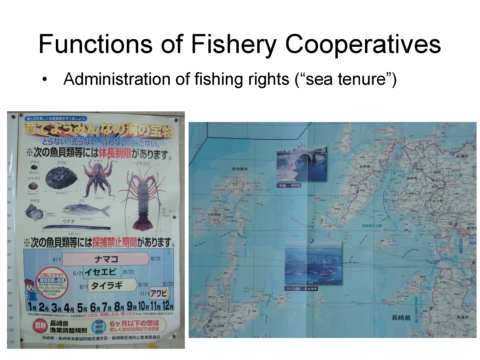 On November 6, human geographer Sonja Ganseforth presented her latest research on the implications of the Japanese Fishery Law reform for small-scale coastal fisheries at the “Coastal Transitions: Blue Economy” 2020 conference. Based on qualitative field research in rural Japan, Sonja’s paper “Blue Growth or Decline in Japanese Coastal Fisheries” analyzed how global discourses of sustainable growth and institutional reform in the Japanese fishing sector are driving the enclosure of one of the last vestiges of natural resource commons. The focus on private capital and presuppositions of economic and scientific rationality drives the commodification and enclosure of this contracting commons – a process supported by domestic political circles as well as through international agenda setting campaigns. Sonja’s presentation is part of her ongoing research project on Fishing communities between growth and demise in Japan. The online conference “Coastal Transitions: Blue Economy” was jointly organized by Liverpool John Moores University, Southern Connecticut State University and MIC University of Limerick.
On November 6, human geographer Sonja Ganseforth presented her latest research on the implications of the Japanese Fishery Law reform for small-scale coastal fisheries at the “Coastal Transitions: Blue Economy” 2020 conference. Based on qualitative field research in rural Japan, Sonja’s paper “Blue Growth or Decline in Japanese Coastal Fisheries” analyzed how global discourses of sustainable growth and institutional reform in the Japanese fishing sector are driving the enclosure of one of the last vestiges of natural resource commons. The focus on private capital and presuppositions of economic and scientific rationality drives the commodification and enclosure of this contracting commons – a process supported by domestic political circles as well as through international agenda setting campaigns. Sonja’s presentation is part of her ongoing research project on Fishing communities between growth and demise in Japan. The online conference “Coastal Transitions: Blue Economy” was jointly organized by Liverpool John Moores University, Southern Connecticut State University and MIC University of Limerick.
Japan’s new Ambassador to Germany visits DIJ
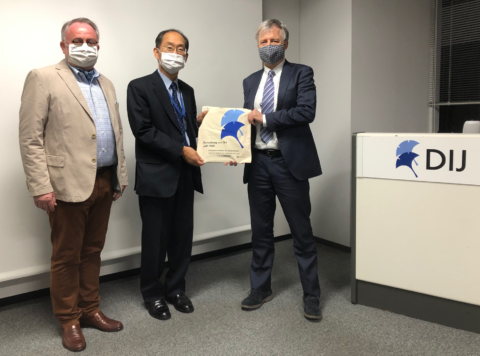
On November 4, Japan’s new Ambassador to the Federal Republic of Germany, Hidenao Yanagi, visited our institute. Director Franz Waldenberger and Administrative Director Joachim Röhr informed Ambassador Yanagi about the ongoing research at the DIJ and the international network of the Max Weber Foundation. In perfect German, Mr. Yanagi reported that he is very much looking forward to his second posting in Berlin, also to deepen his understanding and connection to the new German states. Furthermore, he is looking forward to the upcoming celebrations of the 160th anniversary of the relations between Japan and Germany next year, even though not all of them may be realised due to the ongoing pandemic.
During his visit Mr. Yanagi praised the important role the DIJ has played over the past 30 years in developing German-Japanese relations. From 2014 to 2017 Mr. Yanagi was Consul General in Munich, followed by almost three years as Ambassador to Jordan. We are very pleased and honoured that Ambassador Yanagi took the time to visit our institute a few days before his departure for Berlin.
DIJ researchers in German and Japanese media
Deputy director and sociologist Barbara Holthus is quoted in the current issue of the German weekly newspaper Die Zeit (46/2020). In the article “Zurücktreten, bitte”, Barbara criticizes the restrictions imposed by the Japanese government on foreigners seeking to re-enter Japan during the Corona pandemic.
Historian Torsten Weber is quoted in the German weekly magazine Der Spiegel (45/2020). In “Globaler Kampf”, Torsten comments on nationalist elements in exhibitions promoting the Tokyo Olympics and Japan’s Olympic history. His remarks draw on research he has done for the DIJ’s special project on the Tokyo Olympics.
In the context of recent discussions about politics and academic freedom in Japan, historian of science Harald Kümmerle is quoted in a Kyodo article that was printed in several Japanese daily newspapers, including the Chūgoku Shimbun (1 November 2020). Giving the example of Albert Einstein’s expulsion from the German National Academy of Natural Sciences Leopoldina in 1933, Harald explains the treatment of Jewish scientists in Nazi Germany.
SJCC webinar on Japan’s system of corporate governance

On September 25, DIJ director Franz Waldenberger was guest speaker in the SJCC webinar series, organized by the Swiss-Japanese Chamber of Commerce in cooperation with JETRO Switzerland and the Japan Club of Geneva. Even 30 years of ongoing reforms and structural changes have not improved the image of Japanese corporate governance among foreign investors. In his talk “Japan’s system of corporate governance – bright and dark sides”, Franz Waldenberger explained why Japanese boards remain to be insider controlled and what implications this has for performance. However, he also stressed the positive sides of a system where shareholders can be assured that managers are loyal to their company. A video of the webinar is available on the SJCC’s website.
Barbara Geilhorn on post-3.11 theatre in Swiss radio feature
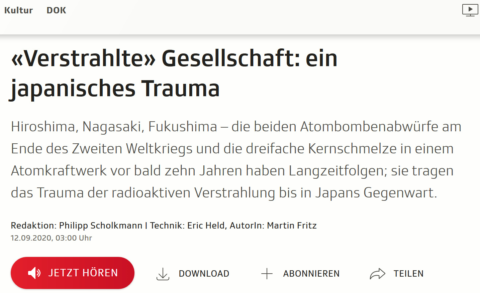
DIJ researcher Barbara Geilhorn has appeared in the SRF Swiss radio feature “Verstrahlte” Gesellschaft: ein japanisches Trauma (“Radiated” society: a Japanese trauma) by Martin Fritz. Drawing on her ongoing research project Local Issues Take Stage – Culture and Community Revitalization, Barbara provided expert commentary on how theatre in Japan has dealt with the nuclear meltdown in Fukushima in 2011. Theatre plays addressed the situation after the accident and the different reactions of people to it: either ignoring the nuclear dangers or facing them and acting accordingly. They also problematized issues of social conformity and the reluctance of Japanese people to voice criticism openly, Barbara explains. The radio programme is available as podcast on the SRF website here (in German)
DIJ research at the AAS-in-Asia 2020 conference
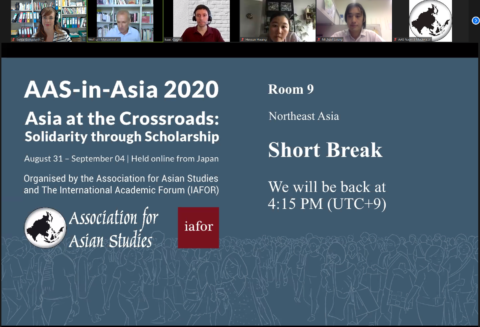 Our research fellows Isaac Gagné and Sonja Ganseforth have presented their latest research on social and economic developments in Japanese rural and fishing communities at the AAS-in-Asia 2020 conference, held online from August 31 to September 4. Isaac analyzed how residents and volunteers conceptualize and actualize local moral worlds of care through community-based services in his paper ‘Moral Worlds of Welfare: Social Isolation and Community-based Care in Aging Japan’. Sonja’s paper ‘New Marinalities of Japanese Fishing Villages’ discussed how structural change in rural Japanese fishing villages can be understood through the analysis of interconnected local, national, and global dynamics. Their panel “Rurality Check: Tracing the Nascent Global Countryside in Asia” was chaired and organized by Wolfram Manzenreiter (University of Vienna) and also had presentations by Heesun Hwang (Seoul National University) and Michael Leung (City University of Hong Kong).
Our research fellows Isaac Gagné and Sonja Ganseforth have presented their latest research on social and economic developments in Japanese rural and fishing communities at the AAS-in-Asia 2020 conference, held online from August 31 to September 4. Isaac analyzed how residents and volunteers conceptualize and actualize local moral worlds of care through community-based services in his paper ‘Moral Worlds of Welfare: Social Isolation and Community-based Care in Aging Japan’. Sonja’s paper ‘New Marinalities of Japanese Fishing Villages’ discussed how structural change in rural Japanese fishing villages can be understood through the analysis of interconnected local, national, and global dynamics. Their panel “Rurality Check: Tracing the Nascent Global Countryside in Asia” was chaired and organized by Wolfram Manzenreiter (University of Vienna) and also had presentations by Heesun Hwang (Seoul National University) and Michael Leung (City University of Hong Kong).
75th anniversary of the end of World War Two in East Asia
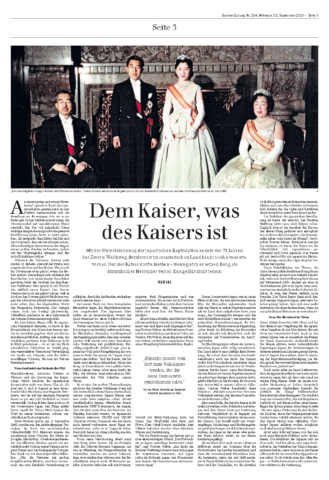 On the occasion of the 75th anniversary of the end of the Second World War in Japan, Torsten Weber has made several comments in German media on the legacy of the war in East Asia (in German) and participated in an online outreach event on the global commemoration of the war (in English). For Deutsche Welle, Torsten explained how territorial and ideological disputes in the region have remained a burden of the war in East Asia. In Badische Zeitung and Berliner Zeitung, Torsten commented on the role of the Japanese Emperor during and after the war. Together with Yukiko Koshiro (Nihon University), Torsten also appeared in the Histocon talk event “Global Perceptions of WW2: Japan” which is part of an online series to discuss how the Second World War is commemorated globally. It is sponsored by the German Federal Agency for Civic Education (Bundeszentrale für politische Bildung).
On the occasion of the 75th anniversary of the end of the Second World War in Japan, Torsten Weber has made several comments in German media on the legacy of the war in East Asia (in German) and participated in an online outreach event on the global commemoration of the war (in English). For Deutsche Welle, Torsten explained how territorial and ideological disputes in the region have remained a burden of the war in East Asia. In Badische Zeitung and Berliner Zeitung, Torsten commented on the role of the Japanese Emperor during and after the war. Together with Yukiko Koshiro (Nihon University), Torsten also appeared in the Histocon talk event “Global Perceptions of WW2: Japan” which is part of an online series to discuss how the Second World War is commemorated globally. It is sponsored by the German Federal Agency for Civic Education (Bundeszentrale für politische Bildung).





 Open Access
Open Access
